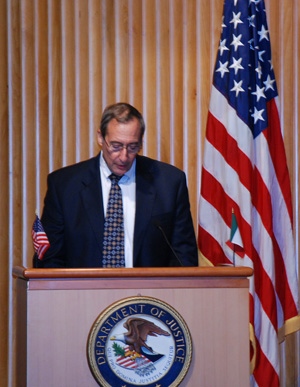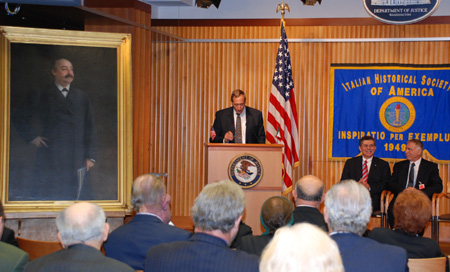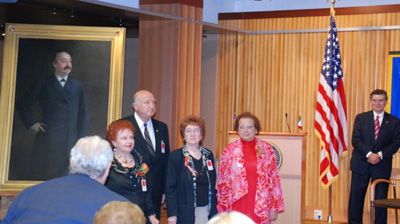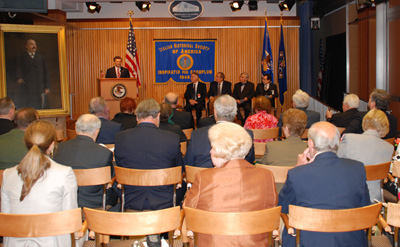
| INDEX TO ARTICLES |
| CONTACT US |
![]()
|
49th Annual Ceremony Commemorating Charles J. Bonaparte Remarks by John Di Cicco, Acting Assistant Attorney General, Tax Division |
|
TEXT OF PREPARED REMARKS OF JOHN DI CICCO Charles Joseph Bonaparte Italian Historical Society of America–DOJ EEOC June 11, 2009 Thank you Francesco for your kind introduction. Good morning ladies and gentlemen Let me start by saying that the halls of the Department of Justice hold the portraits of our past
Attorney Generals. With few exceptions, the accomplishments of many of those men and the one woman who have lead our Department are lost except to a few of us --who either through our interest in history or in our legal work on a particular subject come to know much more about these leaders and their times. That is a great and worthy tradition. A tradition that has made the life of Attorney General Bonaparte better known to many of us and a tradition that has honored his principles and accomplishments. Being of Italian heritage, I am proud of the role that the Italian Historical Society has played in the creation of this tradition. I also understand that over the years a second tradition has developed. That second tradition is that those who have traveled from New York City gather after this ceremony to have a wonderful lunch at a local Italian restaurant. And also, because I am Italian, I am looking forward to eating that lunch, so I won’t talk too long. But it is important to talk a little bit about the outstanding Italian American we are honoring today, Charles Bonaparte, the 46th Attorney General of the United States. I doubt I will be saying anything today that you have not already heard, but even if we have all already heard about what Charles Bonaparte stands for, I still thinks it serves us well to reflect on the principles which guided his life–service to country, and observance of the rule of law. These principles are not just applicable to Italian Americans, but to all Americans. Especially at times when the Department comes under attack, you only have to look back to Charles Bonaparte for a reaffirmation of what the Department and our country stands for. While there have been many, many Italian Americans who have helped make this country great, very few, if any, have contributed more than Charles Bonaparte.
He was a man who when he saw something that could be improved upon in his country, he didn’t just sit back and let others deal with the problem, but set out to do something about it. He was extremely civic minded. He was prominent in many municipal and national reform movements. Early in his career, (1881) he helped found the National Civil Service Reform League and later he served as its chairman. He was very concerned about the prevalence of corrupt public officials, and wanted to change that culture. He went about doing that in a variety of ways, including raising the awareness of the electorate about crimes such as bribery and undue influence that were being committed by public officials; and he argued for the fair and impartial administration of the Government. He was not afraid to speak out about what he believed. In one of his writings he observed that if the politicians of that period were not technically criminals, they were allies and patrons of habitual criminals, and he wanted to put a stop to that. Indeed, Bonaparte acted as Special Counsel in the conviction of a prominent defendant in a Postal Fraud case. But more importantly, he played a critical role in obtaining the adoption of the merit system in the Federal Service, a system that made it much more difficult for crime and corruption to occur within Government, and a system that has produced the finest Civil Service in the world. That is truly one his great legacies. But, he didn’t stop there. His civic concerns brought him into contact with Theodore Roosevelt prior to Roosevelt becoming president. Roosevelt and Bonaparte shared many of the same views. They believed that an appropriate amount of Government intervention was necessary to produce justice. They were also convinced that efficiency and expertise, not political connections, should determine who could best serve in government. Because of those shared ideals, Roosevelt, after becoming President, appointed Bonaparte to a number of national positions. The first was to serve on the Board of Indian Commissioners (1902-04), where, because of his legal acumen and integrity, he was charged with concluding the investigation of land frauds in the Indian Territories. Later, President Roosevelt appointed Bonaparte to two cabinet positions. The first was Secretary of the Navy, where he joined President Roosevelt in effectively urging for both a larger Navy, and a Navy that utilized larger ships. The second cabinet appointment was to be the 46th Attorney General of the United States. I note that many of us here today share a common heritage with Charles Bonaparte, of which we are justifiably proud, and all of us share his commitment to justice and the rule of law. As Bonaparte himself said, “To have a popular Government we must first of all, and before all else, have good citizens”–and that is what he was, above all else–a good citizen. We should all strive to be as good a citizens as he was. Thank you.
|



